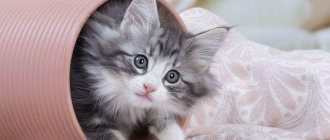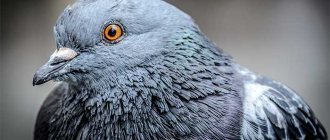Among the 8 cat breeds of the Siamese-Oriental group, the Siamese is the most famous and popular. This oriental beauty has a graceful physique, almond-shaped bright blue eyes and an original color point color: light beige hair on the body and dark brown or black on the face, paws and tail. The Siamese cat is friendly, playful, easy to train, and can be an excellent companion in any family. How long Siamese cats live depends not only on their hereditary characteristics, but also on other factors.
Care and maintenance
Despite its exotic origin, the Siamese cat does not require special care; you only need to follow simple procedures:
- The pet needs to be combed; it is impossible to refuse this completely due to the lack of undercoat. The animal needs this procedure, especially during the molting period.
- The frequency of water procedures depends on the individual characteristics and living conditions of the cat. Each owner must determine it himself by observation, but on average cats are washed once every 2-3 months.
- Nails must be trimmed regularly with special tools. You need to take the cat by the paw and squeeze your finger so that the claw protrudes. Only the regrown white part should be trimmed - it has no sensitivity.
- Caring for your gums and teeth should be regular and thorough. Representatives of this breed are prone to gum disease and tartar formation. Oral care should be carried out daily using a special brush and pastes.
- Ears need to be cleaned at least 1-2 times a week, as dirt and wax accumulate in them. To do this, use a tampon or a piece of soft cloth moistened with vegetable oil or Vaseline.
A Siamese cat must be taught all necessary hygienic care procedures from an early age.
When getting a Siamese cat, you need to know that she, like any representative of the cat family, is a hunter by nature. To maintain health and good emotional state, the animal must move a lot and play enough.
What to feed your cat
In general, the diet of a Siamese pet does not differ from the diet of cats of other breeds. The difficulty stems from the fact that the food should not only be healthy, but also be to the taste of the pet. Otherwise, she may become capricious and refuse to eat. The diet can consist of natural products or ready-made feeds; a mixed diet option is also acceptable. The main thing is that the food contains a complete set of vitamins and microelements.
With a natural diet, the cat should be given the following products:
- Lean or raw red meat. It should be boiled or scalded. Before feeding, the meat must be cut into small pieces.
- Offal. The heart and lung are especially beneficial for cats. But not all Siamese accept such food.
- Egg yolk. The yolk is a valuable source of vitamins. It can only be given in boiled form.
- Fish. Representatives of the Siamese breed really like fish. True, it is often impossible to include it in the diet due to the risk of allergies. You can treat your pet to fish once every three days, giving it instead of meat. The most preferred are low-fat fish, such as navaga, cod, tuna, etc.
- Dairy products. Sour cream, cottage cheese and low-fat kefir can be safely included in the menu. Fresh milk should be avoided.
- Cereals. It is good to cook porridge in water from corn, rice and oatmeal. If desired, you can add pieces of meat there.
- Vegetables. Like any cat, Siamese need fiber, but in small quantities, due to their digestive characteristics. Boiled carrots, cabbage and potatoes should be given in moderate portions. They can be added to meat or porridge by first chopping them.
Excess protein in the diet of a Siamese cat can affect the color of the coat - it may darken. The optimal amount of protein is no more than 60%.
If prepared foods are the preferred nutrition option, then you should select them especially carefully. When purchasing such food, you should take into account not only the composition, but the age of the animal, as well as the individual characteristics and state of its health. Experts recommend choosing premium food.
Unusual facts about Siamese cats are presented in a video from Dima Croft.
Possible diseases and their treatment
Like all purebred animals, Siamese cats have a number of diseases to which they are genetically predisposed. This is explained by the fact that, in pursuit of conformation, breeders often crossed animals from the same litter with each other.
Common pathologies include:
- diseases of the respiratory system (rhintracheitis, calcivosis and asthma);
- psychogenic alopecia (baldness);
- strabismus;
- problems with the vestibular system;
- skin asthenia;
- mammary cancer.
But if your Siamese cat does get sick, you should immediately contact a veterinarian for qualified help. Under no circumstances should you self-medicate - only a specialist can determine the correct diagnosis and therapy.
Nutrition
Rational feeding is an important point to ensure a happy life for a pet. Every living creature needs proteins, fats and carbohydrates. In the first weeks, proteins are of greatest value, as the most important building material.
Over the years, the need for proteins gradually decreases. An older animal will need a gentle diet. These should be foods that are easy to digest.
There are several feeding options:
- ready-made food,
- natural food,
- mixed.
At an early age, natural products . These are meat, vegetables and cereals, with the obligatory addition of vitamin complexes. The most important supplement for Siamese babies is often cottage cheese and milk porridge. These are important sources of calcium for the body, which quickly gains weight. Meat and offal must be of high quality and low-fat varieties. It is not advisable to feed your mustachioed ward pork and pork by-products, as they contain an excessive amount of fat.
Store-bought food is convenient because it does not need to be prepared. You just need to open a new package. They contain all the essential minerals and vitamins, so no additional nutritional supplements are required. Dry granules can be left in a bowl all day - it will not spoil. Canned food, on the contrary, should not be stored in the fresh air for more than two to three hours. They are more expensive than dry ones, but do not have their disadvantages: when eating a dry product, the wards must drink a lot. This is important for complete digestion of dried granules.
Mixed feeding is not recommended by veterinarians, as it will cause an excess of certain vitamins. Industrial feeds have a balanced composition, which the wards need depending on the number of years they have lived. The addition of natural substances leads to an excess of nutrients in the body, for example, cottage cheese - to excess calcium, liver - fat-soluble vitamins.
To read: Comparison of the two most fluffy dogs German and Pomeranian Spitz: how do the breeds differ?
Appearance. What does a Siamese cat look like?
These animals have a thin, elongated, muscular body of regular shape. The paws are long and thin, ending in rounded soft pads of a dark color. The head is large, with a developed skull.
The cheeks are not plump, the features of the muzzle are sharp and aristocratic. The ears are large, large, widely spaced, proportional. Eyes with an oblong cut, bright and lively, blue, large and expressive.
The chin is round and powerful; The jaw bones are well developed. The neck is muscular, long and thin. The color is soft, sandy. On the paws and face there is a dark brown or black mask that is proportional and regular.
The tail is long, narrow, reaching a length of 15-20 centimeters.
The coat is normally shiny, smooth, and does not fall out when held by hand. With pathology, it is dull, greasy, and falls out in tufts or individual hairs.
Colors
The most popular colors are the following:
- Chocolate point (the main color is ivory, there are a small number of milk chocolate spots, the paw pads and nose are light brown with a slight pink tint);
- The seal point color is a whole palette of shades. Cream to light yellow as the base color and brown flowers on the limbs and face.
- The Blue Point, as the name implies, boasts an elegant bluish-gray color. At the same time, the cat’s nose is colored slate gray, as are the paw pads, and gray-blue spots and inclusions are allowed on the body.
- The lilac point includes a pink nose, lavender paw pads and a white body with blue and gray spots.
In the photo there is a Siamese cat of the main colors: chocolate, blue, lilac.
The above colors are accepted by the Cat Fanciers Association. And the International Cat Association allows a few more: red point (apricot or red spots on a snow-white body); caramel point (pale shade of cream, caramel pink paws and nose); cinnamon point (the coat has a noble shade of bone, pink-brown paw pads and the nose of the same shade).
Buying a Siamese cat: recommendations
As a rule, kittens can be purchased at three months of age, since by this period they have already been vaccinated and socialized.
Where to buy, what to look for
Naturally, you should not contact the first breeders you come across, giving preference to well-known ones, as well as nurseries where they breed this breed. If you have no experience, then it is better to involve an experienced specialist in this process, if you have one, among your friends.
When buying a kitten, you need to pay attention to the fact that it has a birth certificate (pedigree), as well as a veterinary passport indicating all vaccinations, as well as deworming performed. It would be a good idea to see the kitten’s parents and also observe their behavior.
The kitten should show curiosity, playfulness and be healthy and active. When purchasing a kitten, you can already decide on the main color, since already on the 14th day the paws, nose, etc. are painted.
Siamese cat price
On the territory of our country, in almost all major cities you can find a nursery that practices breeding Siamese cats.
For a kitten, depending on some factors, such as the popularity of the nursery, the purity of the breed, as well as the exterior, you can pay between 100-800 euros.
Naturally, not everyone is particularly interested in pedigrees with famous parents, but only those who plan to further involve animals in breeding work or in cat shows. Kittens that correspond to show class can be valued between 300-800 euros. If Siamese kittens are brought from abroad, they are much more expensive.
If the kitten does not belong to the show class and has minor deviations, then they will ask for no more than 100 euros, which will significantly save money. Of course, you can buy it cheaper, and significantly, if you use advertisements on the Internet, but there is a high probability that the animal will not meet breed standards at all.
Chronic diseases
Poor nutrition and infrequent visits to the veterinarian provoke the development of chronic diseases. The most common problems are with the gastrointestinal system or kidneys. Feeding “from the table” - those products that are intended for people - leads to chronic gastritis, pancreatitis, and liver failure.
The reason for this is the high content of fat, spices and salt in human food, the difficulty of digesting it. Therefore, veterinarians do not advise feeding cats their own food; this is a direct path to digestive organ failure.
Economy-class dry food and excess fish in the diet lead to kidney disease. Excess salts from granules and fish are deposited in the form of stones in the kidneys and ureters and interfere with the normal passage of urine. The insidiousness of urolithiasis is in its hidden course. It may take several years for stones to block the urinary system. An animal can die from an acute attack of renal colic. But if this does not happen, the cat will begin to develop chronic renal failure, which accelerates death.
For the longevity of your pet, you should follow the simplest tips: take a kitten from trusted breeders, get vaccinations on time and feed them with high-quality food. If nothing bothers your ward, then just a quick annual visit to the veterinarian is enough to keep him around for many years.
Siamese cats are one of the most famous breeds, they are valued all over the world for their slender figure, special voice, playful nature, blue eyes, and many other things. If cared for properly, Siamese cats can truly enjoy their comfort and longevity.
Care
The lifespan of a cat will be largely influenced by care and nutrition.
The main activities depend on where the newly arrived family member comes from. If you purchased it from a responsible breeder, then everything is much simpler. As a rule, kittens are sold only at 2.5-3 months. At this time, they are able to feed themselves, they do not depend on their mother and will endure separation from her almost painlessly. By 3 months they receive their first vaccinations: usually this is a complex vaccine against several microbes at once. In the future, revaccination is required every year - it is necessary to strengthen immunity. If for some reason the vaccine is not administered on time, then repeated injections are given. Only double vaccination can create strong immunity against infections.
The Siamese breed is characterized by good health. They are little susceptible to pathologies of internal organs. Therefore, the only thing your pet needs is an annual examination by a veterinarian with blood and urine tests. These studies will help identify possible diseases at an early asymptomatic stage.
Siamese, as representatives of the East, grow up quickly. Therefore, early sterilization is applied to them. During estrus, both males and females behave excessively active, meowing loudly and protractedly. Already at 6-7 months they are operated on, because the best results can only be achieved with sterilization before the first heat.
httpv://www.youtube.com/watch?v=embed/zDCP8pgy8ho
Ways to increase an important demographic indicator
Vigilant owners are attentive to the health of their pets.
There are several tips that you can follow to maintain your Siamese cat’s immunity for a long time.
- Examination by a specialist - at least once a month. Such frequent communication with the veterinarian is due to the fact that diseases can develop rapidly in cats. To prevent complications in the bud, it is better to visit the veterinarian more often.
- Sterilization puts a strain on the cat’s body: animals often gain weight after surgery. This happens due to the fact that metabolism slows down, and food arrives in the same volume. After castration, it is necessary to follow a certain diet, thanks to which the cat’s body will not be oversaturated with food.
- Water procedures in old age are bad . In old age, a cat's body slowly loses control over important life support systems. Sometimes it is better to skip a shower or bath intended for a Siamese cat: a slight draft will quickly create a threat of illness.
- There is no need to let the cat outside. Statistics from several years of studying cat mortality indicate that cats that regularly walk live several years less than cats that sit at home on a permanent basis. This is due to infections that wandering pets pick up and bring with them. This does not mean that you should absolutely not let your cat go for walks - just buy a collar and walk your little friend on a leash. This way he won't get into a trash can and fight with a street cat.
Factors in cat longevity
This animal is believed to have 9 lives. This opinion was formed on the basis that a cat falling from the 5th floor will not break. An animal that has been involved in an accident may also remain alive. How long do cats live? One year of her life is equivalent to 7 years of human life. On average, cats live up to 20 years. Although they
, if you care for them correctly and regularly.
Factors that influence a cat's lifespan include:
- living conditions of the animal,
- proper and balanced nutrition,
- cat breed,
- genetic predisposition to certain diseases,
- presence of stressful situations.
Living conditions
Life expectancy is primarily influenced by the habitat. Animals that live in an apartment and rarely go outside can live much longer than their street counterparts. The short life of barn cats is due to factors such as:
- dog attack;
- car accident;
- infection with various infections from other animals;
- poor nutrition, poisoning;
- human threat.
On average, barn cats live 5-8 years.
Domestic cats live up to 20 years. The main factor in their longevity is favorable living conditions, proper care and concern from their owners, as well as the lack of the lifestyle that street cats lead. Pets live stress-free lives because they are confident that they will not be poisoned, will not be attacked, and that they are completely safe at home.
Cats feel very well how they are treated, so you need to love her and create comfortable living conditions for her.
Cats need to be fed a proper and balanced diet. You should not feed animals only with special food; you must give them regular food. The food will be different from the food the pet owner eats. For a pet to live a full life, you need to know certain nutritional rules.
It is known that cheap dry food is addictive and provokes the development of various diseases. Milk can cause stomach upset in cats, since the cat's adult body is not able to process the lactose contained in milk. Only kittens can be fed milk. If the animal does not want to eat dairy products, then you should not insist on it.
The meat should be lean, it can be either raw or boiled. The meat can be soaked in a small amount of vegetable oil or mixed with boiled vegetables. It is necessary to feed cats sausage and purchased minced meat as little as possible, since these products adversely affect the liver of animals.
Obesity is common, which can cause diseases such as diabetes, constipation, stroke, and oncology. If a cat’s ribs cannot be felt, then it must be fed a special diet in order for it to lose weight faster.
It is believed that the lifespan of a cat depends on the breed. This is a rather controversial statement, since in addition to the breed there are many other, more significant factors. Nevertheless, it is believed that British and Siamese cats live up to 15 years, Persian cats - up to 17 years.
How long do British cats live? This is not known for certain, since many factors influence life expectancy. The Briton breed was developed in Great Britain in the 19th century. A distinctive feature of this particular breed is that the animals have a stable immune system and therefore rarely suffer from various diseases.
How long do Siamese cats live? Siamese live from 12 to 18 years. There are cases when they lived up to 20 and 30 years, but this is very rare for this breed. This breed is considered the healthiest among all other breeds. In addition, do not forget about special vaccinations and frequent veterinary examinations.
The longest-living cats are recorded in the Guinness Book of Records. British Lucy lived for 41 years and is still living. The oldest cat comes from the USA and lived 38 years. According to statistics, cats live the longest in the UK.
Any owner of a furry friend wants their pet to live as long as possible. Which cat breeds live the longest? Siamese, Bengal, Persian, Siberian cats will delight you for 15-18 years. It is worth noting that these breeds had long-lived cats.
The long-living cat and cat were included in the Guinness Book of Records. The cat lived 38 years, and the cat lived 38 years and two months. There is currently a cat living in the UK, she is already 43 years old. She is active, but has difficulty hearing. There is a cat living in Australia, she is 37 years old. She is healthy and active, and no one can tell by her appearance that she is that old. Therefore, to the question of how long long-lived cats live, we can safely answer that almost half a century.
The love of the owners, excellent care and quality food help pets live long and remain vigorous and healthy.
What can be done to prolong the life of an animal?
Cats, like humans, develop various diseases as they age. The development of pathologies is provoked by poor nutrition, low physical activity, and poor ecology. Research into the aging process in animals has been carried out by many scientists. As a result, the approximate beginning of this period was established: 5-6 years.
The research was based on the fact that with the onset of aging, the amount of natural antioxidants in the body of cats decreases, and the immune system weakens. These processes cannot be stopped, but they can be significantly slowed down
To make your cat's old age happy, it is important to follow several recommendations:
Selection of high-quality food and regular intake of multivitamins. Neutered kitties must follow a diet; such animals are prone to obesity. Closely monitoring the pet's condition. You can't always tell from a cat where it hurts. It is necessary to detect any changes in the animal’s behavior and consult a doctor promptly.
The importance of vaccinations and preventive examinations has already been mentioned above. Physical activity
Their health and life expectancy directly depend on how active domestic Persians, Sphynxes, British, Siberian, Siamese, Scottish Folds and other breeds of furry pets are. Caring for your ears, teeth, and maintaining good hygiene. Regular antiparasitic treatment. Fleas are carriers of dangerous diseases, so insects must be gotten rid of immediately. Intestinal parasites can cause serious problems in a cat's body. Sterilization. If the animal is not intended for breeding, then it is better to undergo surgery. The attention, affection and care of a loving owner not only prolongs the pet’s life, but also makes it bright and joyful
If animals do not have congenital pathologies, then following these simple rules will allow them to live to 20 years or more.
Breed Features
The historical homeland of Siamese cats is sunny Thailand. Having attracted the attention of the British who were in the country, cats with gray-black coats migrated to Foggy Albion. Thus began the breed’s ascent to feline Olympus.
The new owners were captivated by the beauty and grace of the animal. The whiskers, paws, tail and muzzle of the Siamese (or Thai) breed aroused the admiration of anyone who had the honor of having an audience with a foreign guest.
In their homeland, Siamese cats were considered almost gods. Commoners were forbidden to look at them on pain of death. Siamese cats lived in the temples and chambers of the emperor. Moreover, peasants often considered them guides to the world of spirits.
ATTENTION! Previously, strabismus in Siamese cats was considered the norm and even gave a zest, but now it is considered a serious omission and requires the intervention of a specialist. A crease in the tail is also considered a sign of an unhealthy animal.
It is worth noting that kittens from Siamese cats are born completely white. Small and clumsy, they look like snowflakes that have never been seen in their historical homeland
A crease in the tail is also considered a sign of an unhealthy animal. It is worth noting that kittens from Siamese cats are born completely white. Small and clumsy, they look like snowflakes that have never been seen in their historical homeland.
At home, Thai beauties and handsome men require increased attention and are very offended when their owners do not have time to scratch their purrs behind the ears. The situation can be improved if you make friends with soft toys or other animals. Contrary to popular belief about the aggressiveness of Siamese cats, we can say that they are incredibly kind and sympathetic creatures.
They easily find language with dogs, although they take a long time to rub in and sniff, especially with huge dogs. Don’t be surprised when the royal Thai cat sniffs a huge bullmastiff, and he condescendingly licks her with his large, rough tongue. Although Siamese cats do not communicate well with their relatives, they are jealous of their owner and are not ready to share shelter and food with others.
Siamese cats have a lot of energy, they are incredibly active, and they love to sleep at heights. Of course, if it is warm and soft there. Some royals prefer to sleep directly on their owners, and very unceremoniously jump onto their sides or backs.
Siamese cats are non-aggressive. But they are extremely vindictive and will not forgive the offender for the slightest prank.
If a pet becomes jealous of its owner towards another animal or even a family member, it may well take revenge by marking the victim’s sleeping place or clothes. Moreover, the host can become extreme (but there was nothing to change!) or the guest, so that it would be discouraging.
Attitude towards other people, pets, children?
The Siamese are very open and sincere. They treat everyone condescendingly, majestically, demonstrating royal majesty in everything. They will not miss the opportunity to remind the owner of their origin. In the apartment, Siamese are real emperors, demanding a lot of territory for games and royal pastime.
Siamese rarely find a common language with other cats; they are very sensitive and jealous, and do not intend to share the love and affection of their owners with anyone else. With dogs, these cats find a language with fifty percent success.
They are jealous of their owners, but due to different weight categories and size discrepancies, they rarely enter into open confrontation.
Siamese are indifferent to rodents, birds, and other exotic animals. They do not see a competitor and a serious adversary in a creature that is much smaller in size.
The desire to attack a smaller target remains only at the level of instincts when they get too excited. By providing small pets with the proper level of safety, conflicts can be successfully and easily reduced to zero.
Siamese pets treat children politely and affectionately. They will lull babies with gentle purrs, and play with small children without letting out their claws.
Cats of this breed do not offend the small and weak; they live fairly.
Cats are wary of strangers in the house and guests; during a feast they will prefer to hide from prying eyes.
Character and temperament
The temperament of these cats is ambiguous. They are reasonable and sweet, but at the same time willful and quick-tempered. Most of all, Siamese do not like it when their space is limited or prevented from achieving what they want.
Cats of this breed are resourceful and inventive, they are kind to humans and appreciate their attention and care, but they slowly and difficultly get used to changing environmental conditions. Siamese are more likely to be excellent companions and companions than pliable “soft toys”
Representatives of this breed are often susceptible to urinary tract diseases. The cardiovascular and respiratory systems are healthy, sometimes pathologies affect the reproductive organs.
There are no problems with the Siamese's coat if you bathe them promptly and brush them twice a week. It happens that the ears are affected by ear mites. The disease is called otodectosis.
Siamese are a graceful and graceful breed, so they should not be overfed - the backbone and skeletal muscles of the breed are physically unable to tolerate an obese animal.
Choice of kittens
The issue of purchasing a Siamese kitten should be approached based on future plans for the pet. It is necessary to consider whether the animal will participate in exhibitions or simply live at home as a pet.
Where to buy and how much it costs
Due to the popularity of Oriental-type cats, many offers to buy animals of this breed have appeared on the market, but not all of them can guarantee purebredness. Therefore, it is better to buy an animal from breeders with a good reputation. It is worth keeping in mind that kittens with a pedigree are quite expensive - from 10 thousand to 30 thousand rubles. and higher. The price of an ordinary kitten is from 3 thousand rubles.
What to look for
For those who are going to participate in exhibitions and engage in breeding, it is important to confirm the purebred of the breed. In this case, you should pay attention to documents reflecting the pedigree, and it is advisable to get to know the baby’s parents. If the kitten will simply serve as a family friend, it is enough to focus on the appearance of the parents and compliance with the main indicators of the breed standard.
In addition, when choosing, you need to pay attention to general signs of health:
- wool quality and skin condition;
- the presence or absence of nodules and bumps on the body;
- condition of the eyes, ears, mouth and nose;
- mobility;
- body mass.
When choosing a pet, you need to take into account that Siamese kittens are born completely white. Color appears gradually from two weeks of age and may change during the first year of life.
How long do Siamese cats live at home?
However, if you correctly prepare a diet for your pet, if you do periodic examinations at the veterinarian, then a Siamese cat can live 20 years or more.
What affects the lifespan of Siamese cats?
- The conditions in which the cat lives. Domestic Siamese pets live about 5 years longer than street ones. At home, this breed receives proper care and attention. Living in an apartment, a Siamese cat always feels safe, which is why there is no stress that outdoor cats experience.
- Proper nutrition. This life factor directly depends on the owners. If you want your Siamese cat to live as long as possible, then you should take care of her balanced diet. You should not accustom your pet to dry food, they quickly become addictive, leading to further health problems. The animal's food should not be fatty, smoked, sweet or salty. Everything should be in moderation. It is best to cook for Siamese cats yourself. This, of course, will require additional personal time, but this will significantly increase the life expectancy of your cat.
- Predisposition to various diseases that are inherited. If your animal's parents had various diseases that were inherited, then it is possible that your cat will also be a carrier of the gene with this disease.
Domestic Siamese cats live about 5 years longer than outdoor cats.
Tips for Extending the Life of Siamese Cats
Visit your veterinarian regularly.
If you want your pet to delight you with its presence for as long as possible, then you should follow a few rules or tips:
- Attend regular veterinary checkups. Do not self-medicate. If you suspect any illness, go to the hospital immediately. Get annual vaccinations to protect your pet from various health complications.
- Don't let your Siamese cat lead a passive lifestyle. For this breed, stress on the body is very important. Play active games at home more often, go for walks outside.
- Monitor the condition of your cat's teeth and entire oral cavity. The wrong foods can get stuck in your teeth or create sores on your gums. Examine your Siamese cat's teeth and gums yourself. If an unpleasant odor or inflammation occurs, contact your veterinarian.
Take care of your teeth.
Rules that will help prolong the life of your pet
- proper nutrition (calorie-balanced and age-appropriate);
- physical exercise;
- timely vaccination against various diseases;
- prevention against all kinds of disorders;
- castration or sterilization of the animal (of course, at the request of the owner);
- routine examinations and examinations by a veterinarian.
How long your pet will live will depend only on you. Give him your care, warmth and love, rejoice in his successes, and he will certainly be happy! Health and longevity to your pet! I hope I was able to answer the question of how many years cats live at home.
Why is castration needed?
All animals have a mating season when they look for a mate to procreate. Cats are no exception. A male, ready to reproduce, is actively looking for a female, which is accompanied by loud screams, constant marks throughout the house and endless attempts to leave in search of his beloved. At this time, males become overly aggressive and mount objects.
We recommend reading: Why the Cat Tramples You with Its Paws Scientists Have Killed You Outright
Castration will not only make life easier for your pet, but will also prevent the animal from reproducing uncontrollably. Sometimes the procedure is performed for medical reasons.
Life
It is difficult to establish the average lifespan of a four-toed house dweller.
Representatives of the British breed can live the same amount of time. It happens that an animal dies 2-3 years after birth, it all depends on the lifestyle, health and atmosphere in which it lives.
The life expectancy of a Siamese cat is affected by:
- heredity. Long or short life is directly related to the genetic characteristics of the genus;
- care. Good food, hygienic care and love from the owner/mistress will give the pet longevity;
- quality treatment. Regular disease prevention and timely medical care.
Health
One of the most important aspects of a cat's longevity is good health. Pure breeds are more prone to a variety of diseases than mixed breeds. Pets can suffer from a variety of diseases, including urolithiasis, kidney disease and eye disease. All of these diseases affect the life of a pet.
It is almost impossible to give a clear answer to the question “how many years do Siamese cats live?” We can only say that on average, Siamese cats live longer than males. The most important thing is that the pet is always in good condition . To do this, you need to undergo regular examinations at a veterinary clinic, create a daily menu, regular walks in the fresh air, and receive attention and sincere love.
All these actions are actually completely easy, perhaps unnecessary in some places, but it is thanks to them that the Siamese cat will live a long life at home, experiencing love and tenderness for its owners. In such an atmosphere, Siamese cats can live 23 years, if not more.
Siamese cats live an average of 20 years if he is forced to move more often and given more attention. Even in old age, an animal should not be left to chance and allowed to sleep all day long. We need to create a motivating environment for them so that they themselves want to run around the house and play. At home, Siamese cats live a very long time if there is care and sincere love around them.











